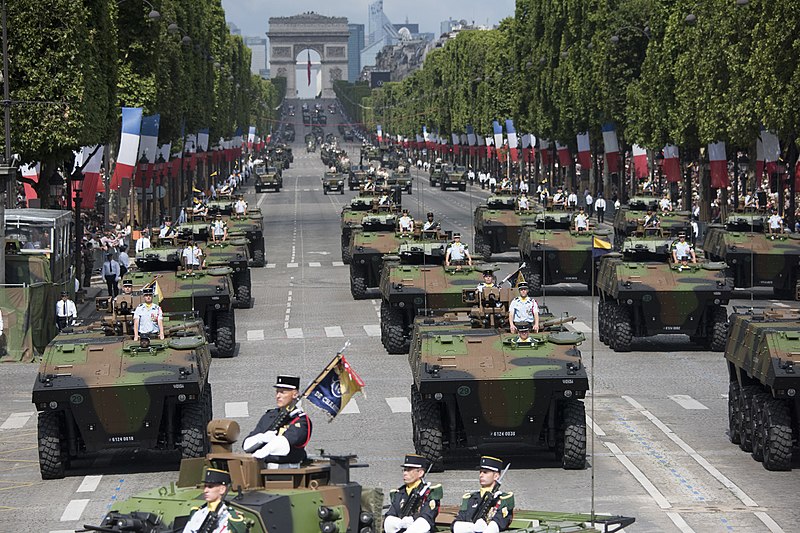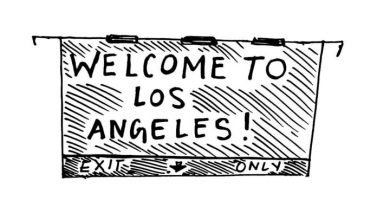U.S. Military Parade to Satisfy Trump’s Ego

Bastille Day 2017 via Wikimedia/ Public Domain
In summer 2017, Trump spoke about his desire to have a parade in Washington, D.C. to demonstrate America’s military might. After seeing France’s Bastille Day parade, Trump claimed, “It was one of the greatest parades [he had] ever seen.” He then remarked that, “We’re going to have to try to top it.”
In 2017, Trump accepted an invitation from French President Emmanuel Macron to visit France for Bastille Day. Celebrating the storming of the bastille during the French Revolution in the 18th century on July 14, Paris boasted a military show exemplifying the power of France’s armed forces. The two hour spectacle included thousands of French troops, 241 horses, 63 airplanes, and 29 helicopters. Trump, Macron, and their wives watched the elaborate military display together, appearing to enjoy the show while periodically engaging in friendly conversation.
Trump’s orders to the Pentagon were, “I want a parade like the one in France,” according to a military official. The Pentagon has continued to draft up possible plans for a military parade, ranging in costs from $3 million to $50 million. This gastronomically high price tag troubles military planners, and some are considering acquiring private donations to alleviate some of the costs. The United States has already been criticized for spending much more on defense than any other country in the world. In 2016, the United States budgeted $664 billion for defense, which was more than twice the amount of the total 2016 defense spending of the other 26 members of NATO. In addition to the issue of cost, one military official explained they just “don’t have troops and units sitting around waiting to do a parade.”
At the moment, there are five different plans currently being developed and worked on: small, medium, heavy, hybrid, and multimedia displays. These options, when ready for review, will be sent to the White House for approval, ultimately letting Trump decide which one will be executed.
The idea of having a military parade has been met with much skepticism and disapproval. In a recent poll conducted by Quinnipiac University, it was found that 61% of voters disapprove of the parade while only 26% approve of it. In addition, 75% said they believe it is a bad use of government funds. Politicians as well are not keen of Trump’s military parade. Vermont Senator Bernie Sanders tweeted on February 7: “Hey, Mr. President: Instead of copying France’s military parade, why not copy France’s health care system? Health care for all, low-cost prescription drugs, much less expensive.”
This is not the first time that Trump has inquired about highlighting the United States’ military power. Trump first brought up the idea for his own inaugural parade. As Defense Secretary Jim Mattis explained, “We’re all aware in this country of the president’s affection and respect for the military.” However, some argue that the parade would be used by Trump merely to boost his self-esteem and satisfy his ego. Trump’s desire for a military parade is yet another example of him engaging in a “macho” competition where he attempts to assert his dominance over other world leaders — in this case France. Trump’s January 2, 2018 tweet to North Korean leader, Kim Jong-un, where Trump declared that his nuclear button “is a much bigger & more powerful one than [Jong-un’s]” is a familiar example of Trump partaking in these petty competitions.
The Washington Post’s Ishaan Tharoor argues that military parades are now archaic and that their main purpose is merely to buttress a leader’s power and rule. Since the turn of the 19th century, the United States has been recognized as a major world power. The United States has presented their military strength through years of imperialism; a military show is therefore unnecessary to demonstrate this “strength.” A parade would only restate the obvious and universally known about the United States’ military. Furthermore, the world tends to be more critical of the United States and its tendency to overstep and intervene in international conflicts when it is not appropriate to do so. One of the most recent examples is the American invasion of Iraq ordered by George Bush in 2003, which has been labeled a failure and an unjustified war. Therefore, a military parade would remind people across the world of our overbearing military and further damage our international reputation.
It is currently unclear when the parade would take place or what exactly it would celebrate. As deliberation continues on the possibility of a military parade, Americans are left to consider how Trump is changing the image of America and what implications are to arise from his actions as he governs the United States with ceaseless rash decisions and explosive tweets.




